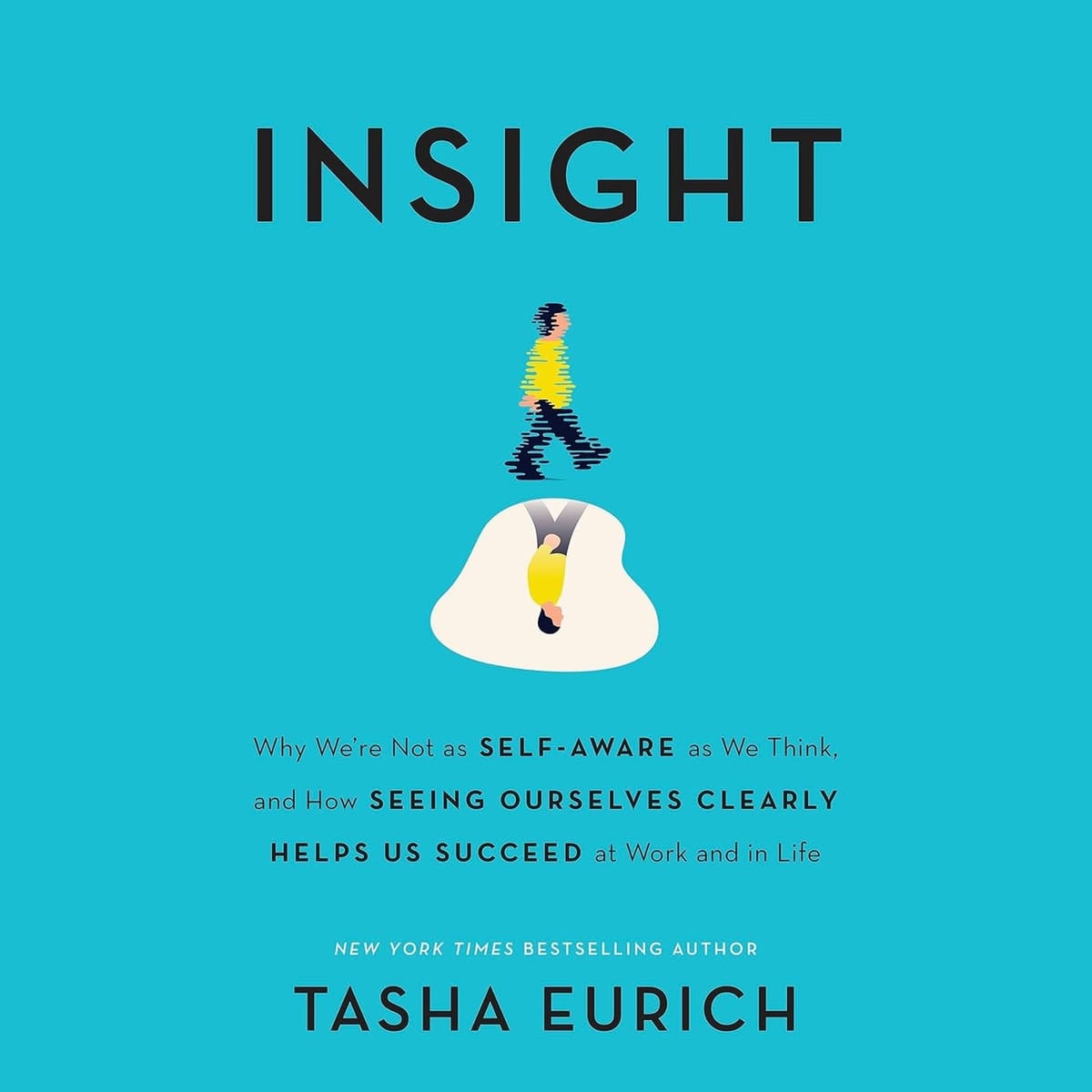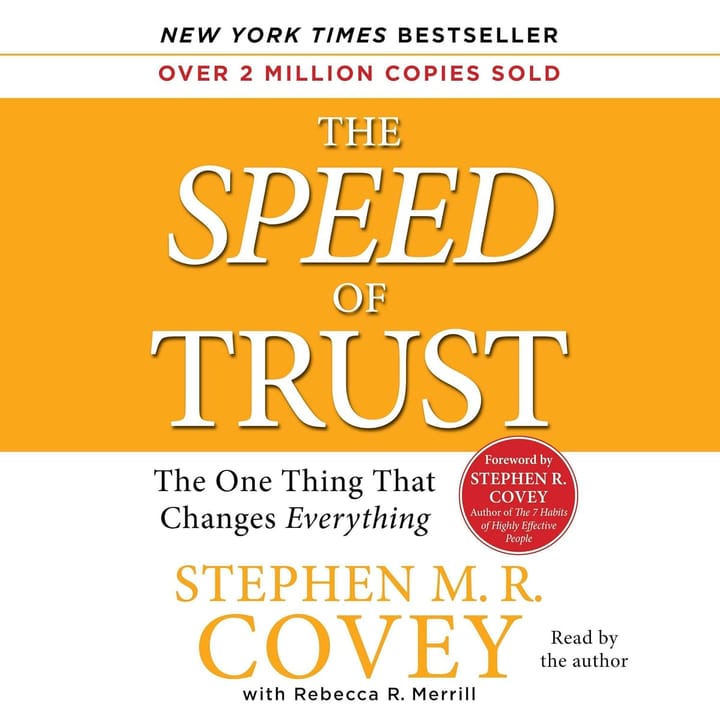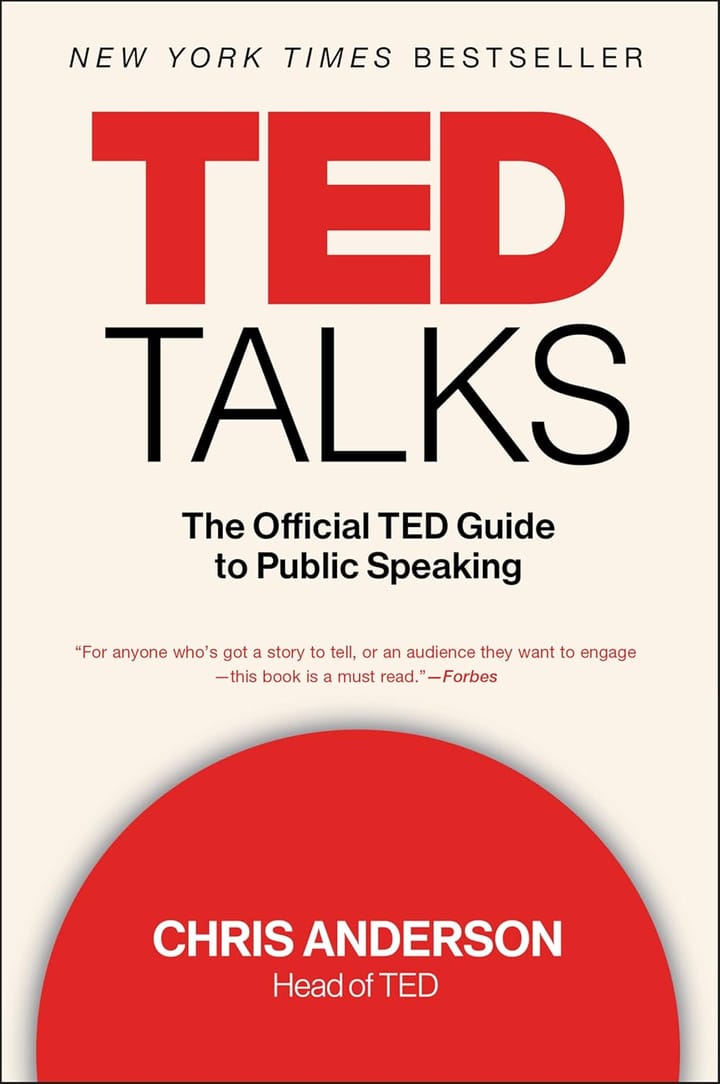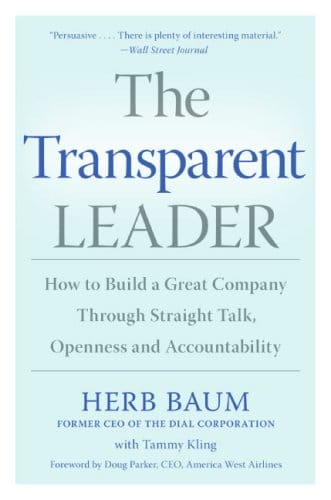Book Summary: Insight
Discover how to improve self-awareness and personal growth with insights from Tasha Eurich's book Insight in this informative summary article.

Essential Insights
- Self-awareness is crucial for personal and professional success.
- There are two types of self-awareness: internal (understanding our thoughts and feelings) and external (understanding how others perceive us).
- Developing self-awareness involves seeking feedback, reflecting on our actions, and being open to change.
Introduction to Insight
Are you ready to enhance your self-awareness and sharpen your leadership skills? Tasha Eurich's book, Insight, is a must-read for anyone looking to deepen their understanding of themselves and others. As an organizational psychologist, Eurich delves into the power of self-awareness and its incredible impact on our personal and professional lives.
For leaders and individuals seeking personal growth and development, Insight offers practical strategies and actionable advice to help you gain a better understanding of your thoughts, emotions, and behaviors. By uncovering blind spots and increasing self-awareness, readers can enhance their decision-making abilities, strengthen relationships, and ultimately become more effective leaders. With compelling research and real-life examples, this book serves as a valuable resource for anyone striving to maximize their potential and lead with authenticity and clarity.
Summary of Insight
Insight by Tasha Eurich explores the importance of self-awareness and its impact on personal and professional growth. The book argues that understanding ourselves better can lead to improved relationships, enhanced decision-making, and overall success in life. Eurich emphasizes the difference between internal knowledge and external feedback, asserting that both play crucial roles in developing a well-rounded self-concept. Through research and anecdotes, she illustrates how individuals can cultivate a deeper understanding of their strengths, weaknesses, and blind spots.
One of the unique contributions of this book is its blend of scientific research with practical application. Eurich provides readers with proven strategies to enhance self-awareness, making the material accessible and actionable. This practical approach empowers readers to take charge of their personal development journey, much like a guide that encourages exploration and growth. Additionally, the book challenges common misconceptions about self-awareness, offering fresh insights that can shift one's approach to personal and professional challenges. Notable ideas introduced in the book include the concept that self-awareness is not a fixed trait but rather a skill that can be developed over time.
Eurich stresses the importance of asking the right questions and being open to feedback, which sets a hopeful tone for those seeking improvement. By emphasizing that growth is a continuous process, the book encourages readers to remain curious and committed to their journey of self-discovery. This inspirational message aligns perfectly with the themes of leadership and personal development, making Insight an invaluable resource for anyone looking to enhance their skills and understanding.
Key Lessons From Insight
Self-Awareness is Essential
One of the central themes of Tasha Eurich's book is the importance of self-awareness. Eurich explains that individuals who possess high self-awareness tend to have better relationships, are more effective leaders, and experience greater overall happiness. She distinguishes between internal self-awareness (how well you know yourself) and external self-awareness (how others perceive you). Many people assume they are self-aware, but few truly are. By actively seeking feedback from others, individuals can develop a clearer picture of themselves.
An illustrative example Eurich provides is the story of a CEO who believed he was transparent and approachable. However, upon soliciting feedback from his employees, he discovered that many felt intimidated and unsure of how to communicate with him. This realization prompted a shift in his leadership style, making him more receptive to his team's needs. The transformation he underwent not only improved his relationships but also enhanced his company's culture.
The lesson highlights how self-awareness can be a powerful catalyst for growth. By understanding oneself and recognizing how others perceive us, we can improve interpersonal dynamics and make more informed decisions. This process can be challenging, as it requires vulnerability and openness to criticism, but the potential benefits in both personal and professional realms can lead to significant improvements in quality of life and outcomes.
Feedback is a Powerful Tool
Eurich emphasizes that feedback is not merely a means of evaluation but a vital component in the journey to self-improvement. Many individuals shy away from seeking feedback out of fear of criticism. However, Eurich argues that constructive feedback serves as a roadmap for personal and professional development. Individuals who actively seek feedback are more likely to identify blind spots and areas needing growth.
This lesson underscores the idea that seeking feedback is not a sign of weakness but rather a proactive approach to growth. When readers recognize that feedback can provide valuable insights, they can shed their fears and view it as an essential tool for enhancing their skills and contributing more effectively to their teams. This change in mindset not only bolsters personal development but also fosters a culture of continuous improvement in workplaces.
Embrace Vulnerability for Connection
Eurich discusses the role of vulnerability in building genuine connections with others. Often, people think showing vulnerability is a sign of weakness. However, the book posits that being open about our struggles fosters empathy and strengthens relationships. When leaders allow themselves to be vulnerable, they create environments where team members feel safe to express themselves and take risks.
A compelling example in the book highlights a leader who shared their challenges during a company-wide meeting. Instead of facing judgment, the leader found that many employees empathized and opened up about their own struggles, leading to a deeper sense of community and collaboration within the team. The resulting authentic connections increased morale and inspired individuals to support one another.
This lesson on vulnerability challenges readers to reconsider their preconceived notions about strength and emotional openness. Adopting a more vulnerable approach can lead to stronger relationships, both personally and professionally. As individuals become more comfortable sharing their struggles and imperfections, they create a space for authentic connections that can enhance teamwork and collaboration.
Intentional Action Drives Change
Another critical lesson in Eurich's book is the idea that intentional actions lead to meaningful change. It is not enough to simply understand oneself or recognize areas for improvement—taking deliberate steps is crucial. Eurich emphasizes the importance of setting clear goals and being proactive rather than reactive in our pursuits. This approach encourages individuals to take ownership of their development journeys.
An insightful example Eurich shares is that of a manager who realized the team's productivity had declined. Instead of passively waiting for improvement, the manager set specific objectives for their team, incorporating regular check-ins and accountability measures. This intentional approach not only revived productivity but also encouraged team members to take initiative in their own projects.
This lesson serves as a powerful reminder that awareness and understanding must be transformed into action. Readers are inspired to set clear goals and take steps toward achieving them, leading to greater fulfillment in both their personal and professional lives. When individuals act with intention, they can create a meaningful impact and become active agents of change within their environments.
Application Ideas for Insight
Embrace Self-Reflection
Self-reflection is an essential practice highlighted in Tasha Eurich's book, advocating for individuals to regularly examine their thoughts, feelings, and actions. To initiate this process, set aside dedicated time each week to reflect on your experiences, choices, and interactions. This could involve journaling about significant events that occurred during the week, what you felt during those times, and the outcome of your actions. By consistently engaging in self-reflection, you will develop a clearer understanding of how your behaviors influence your surroundings.
To effectively implement self-reflection in daily life, you can choose a specific day and time for this practice. Perhaps a quiet Sunday morning or a peaceful Friday evening could serve as your reflection time. The key is to create a ritual around it that is comfortable and encourages openness. Additionally, try to concentrate not just on failures, but also on successes, learning from both sides to shape your future decisions.
For an added layer to your reflection, consider discussing your insights with a trusted friend or mentor. This can provide additional perspectives that you might not see on your own, enriching the learning experience. An example of this could be a leader who, after reflecting on a failed team project, shares their experience with a more seasoned colleague. The colleague then offers insights that lead the leader to a new strategy for team management, reinforcing the value of both self-reflection and external dialogue.
Solicit Feedback Regularly
Seeking feedback from others is another crucial step in personal growth, as discussed in Eurich's work. Proactively asking for constructive criticism helps bridge the gap between your self-perception and how others perceive you. Create a structured approach by making it a point to seek feedback at least once a month from colleagues, team members, or friends. Frame your questions to elicit specific insights, such as asking, “What could I have done better in our last meeting?” This targeted approach fosters clarity in the feedback you receive.
In your role as a leader, actively encourage a culture of feedback within your team. This can be facilitated through regular one-on-one check-ins where team members feel safe to share their thoughts on each other's performance. This not only promotes open communication but also helps create an atmosphere where continuous improvement is a team goal. A constructive dialogue surrounding feedback can foster trust and collaboration among team members.
A practical tip for facilitating feedback sessions is to prepare a few guiding questions in advance. Doing so can alleviate any potential awkwardness and make the conversation run more smoothly. Additionally, when you receive feedback, respond with gratitude and openness, regardless of your initial feelings about the comments. For instance, if a team member suggests that your presentation style is a bit too formal, thank them for sharing and consider how you might adjust your approach in the future.
Practice Empathy in Interactions
Demonstrating empathy in daily interactions is a powerful application of the concepts from Eurich's book. This involves taking the time to understand others' feelings and viewpoints. Start by making a conscious effort to listen actively during conversations. When someone is speaking, focus fully on their words without planning your response in advance. This often involves engaging in non-verbal communication such as nodding and maintaining eye contact, which can help affirm that you value their perspective.
For leaders, showing empathy can significantly boost team morale and productivity. Implementing regular team check-ins can serve as an opportunity to gauge everyone’s emotional well-being. Ask open-ended questions that invite your team members to share their thoughts and feelings about their current projects and workload. Creating an environment where empathy is prioritized can lead to better collaboration and an enhanced sense of belonging among team members.
To make empathy a regular practice, set reminders to consciously approach conversations with this mindset. Additionally, after a critical meeting or interaction, take a moment to reflect on how others might have felt, and how you could have responded more empathetically. For example, if a colleague seems overwhelmed with deadlines, recognizing this pressure and offering support can go a long way in fostering a positive work environment.
Set Clear Goals for Development
Establishing clear personal or professional development goals is crucial to translate the learnings from Eurich's insights into tangible progress. Begin by identifying one area you’d like to improve, whether it’s enhancing your public speaking skills or increasing your emotional intelligence. Use the SMART criteria (Specific, Measurable, Achievable, Relevant, Time-bound) to articulate your goals effectively. This structured approach provides clarity and direction for your development journey.
Once you've set your goals, create a plan for tracking your progress. This could involve setting mini-milestones leading to your larger aim. For example, if your goal is to improve public speaking, you might aim to present in a team meeting each month, culminating in a larger presentation at a company event. Documenting your progress along the way not only helps keep you accountable but can also act as motivation as you see yourself moving forward.
Finally, make it a habit to revisit and adjust your goals regularly. Life can shift unexpectedly, and your goals might need to be adapted accordingly. For instance, if you find that your initial timeline for improvement is unrealistic, it’s okay to extend it rather than abandon it altogether. A real-world application could involve a manager setting a goal to enhance team communication within a quarter, monitoring progress through monthly team health assessments, ultimately leading to strengthened relationships and improved performance.
Concluding Thoughts
Tasha Eurich's book emphasizes the essential nature of self-awareness and its vital contributions to both personal and professional growth. The exploration of internal and external self-awareness highlights that understanding ourselves better can enhance our relationships, decision-making abilities, and overall success. Through both research and real-life stories, Eurich outlines the importance of feedback in this journey, as it allows individuals to recognize their blind spots and grow. Eurich provides readers with effective strategies for enhancing self-awareness, demonstrating that it is a skill that can be nurtured over time. By fostering curiosity and openness to feedback, readers are encouraged to embrace a continuous journey of self-discovery.
The lessons shared in the book, such as soliciting feedback regularly, practicing vulnerability, and setting clear goals, equip individuals with practical tools to enhance their development. The value of seeking feedback and engaging in self-reflection is underscored as essential components of growth. Eurich's advice to create a structured approach to feedback-seeking and to set aside time for self-reflection offers readers a roadmap to improving their awareness of themselves and their impact on others. The book highlights how empathy and intentional actions can lead to stronger relationships and a more supportive environment, both personally and professionally. Readers are invited to consider how they can incorporate these lessons into their lives. By understanding the importance of self-awareness and taking actionable steps toward personal development, they can enhance their effectiveness and fulfillment.
The book serves as a powerful resource, providing a blend of scientific backing and practical application to support readers on their journey. As you explore the lessons in Eurich's work, consider how you might integrate these principles into your daily routine. Take actionable steps to boost your self-awareness, seek out constructive feedback, and engage in meaningful self-reflection. By committing to these practices, you have the potential to significantly improve both your personal and professional life. Embrace this opportunity to grow, learn, and connect with those around you, inspiring positive change within yourself and your community.
Related Topics
- Self-awareness - Understanding one's own thoughts, feelings, and behaviors in order to improve personal growth and development.
- Emotional intelligence - The ability to recognize and manage one's own emotions, as well as the emotions of others.
- Leadership - The ability to inspire and guide others towards a common goal, which requires a high level of self-awareness.
- Personal growth - The ongoing process of improving oneself through self-reflection, learning, and goal-setting.
- Communication skills - The ability to convey information effectively and listen actively, which is key to increasing self-awareness in social interactions.
Reflection & Discussion Questions
Reflection is a powerful tool for personal growth and leadership development. Whether you're exploring your own experiences or engaging in thoughtful group discussion or team training, reflection questions help uncover new insights, clarify values, and inspire meaningful action. Below are questions designed to deepen your understanding of the concepts taught in Insight, and facilitate constructive conversations with your team or group.
- How can you distinguish between your internal self-awareness and external self-awareness?
- What steps can you take to actively seek feedback from others to improve your self-awareness?
- How can vulnerability help you build genuine connections with others in both personal and professional settings?
- Why is it important to take intentional actions to drive meaningful change in your life?
- How can you incorporate self-reflection into your weekly routine to gain a better understanding of yourself?
- What strategies can you use to solicit constructive feedback regularly from colleagues, team members, or friends?
- How can practicing empathy in your interactions enhance your relationships and leadership effectiveness?
- What methods can you use to set clear, achievable goals for your personal or professional development?
- How can you shift your mindset to view feedback as a tool for growth rather than criticism?
- How can you create an environment of open communication and trust within your team through feedback and vulnerability?
- What role does self-awareness play in effective decision-making and leadership?
- How can embracing vulnerability and openness lead to improved collaboration and teamwork?
- What are some strategies you can use to actively listen and show empathy in your daily interactions?
- How can setting specific objectives and taking intentional actions contribute to your personal growth and development?
- How can you balance reflecting on both failures and successes to gain valuable insights for your self-improvement journey?
Recommended Reading
Below are a few recommended books related to concepts taught in Insight.
- Emotional Intelligence 2.0 by Travis Bradberry and Jean Greaves. This book offers strategies and techniques for improving emotional intelligence to better understand ourselves and others.
- Daring Greatly by Brené Brown. Brené Brown explores vulnerability and shame, encouraging readers to embrace vulnerability as a source of strength and connection.
- The Power of Now by Eckhart Tolle. This book discusses the importance of living in the present moment to achieve personal growth and fulfillment.
Frequently Asked Questions
What is the main premise of the book Insight by Tasha Eurich?
The main premise of Insight by Tasha Eurich is that self-awareness is crucial for personal and professional success. The book explores how to gain a deeper understanding of ourselves, our behaviors, and our impact on others through proven strategies and practical advice. By increasing our self-awareness, we can make better decisions, improve our relationships, and ultimately lead a more fulfilling life.
What are some common misconceptions about self-awareness?
Some common misconceptions about self-awareness include the belief that it is all about introspection, that it is a soft skill rather than a critical skill, and that it can be developed solely through meditation or self-reflection. In reality, self-awareness involves looking both inward and outward, is a critical skill that can lead to improved performance and relationships, and requires a combination of internal reflection and external feedback.
How can I become more self-aware in my daily life?
To become more self-aware in your daily life, it's important to make time for self-reflection and introspection. This can be done through practices such as journaling, meditation, or simply setting aside a few moments each day to check in with yourself and your emotions. Additionally, seeking feedback from others can provide valuable insights into how others perceive you. Remember to approach this process with curiosity and an open mind, as self-awareness is a journey that requires continuous effort and growth.
What should I do if I struggle with self-awareness?
To improve your self-awareness, you can start by setting aside time for reflection and self-assessment. Try journaling about your thoughts and feelings, seeking feedback from others, and practicing mindfulness. It may also be helpful to work with a therapist or coach who can provide guidance and support in your journey to becoming more self-aware.
Affiliate Disclaimer
Some of the links on this website may be affiliate links. This means that, at no additional cost to you, we may earn a commission if you click through and make a purchase. Your support through these affiliate links helps sustain and improve the quality of the content we provide.



